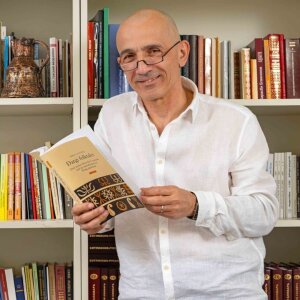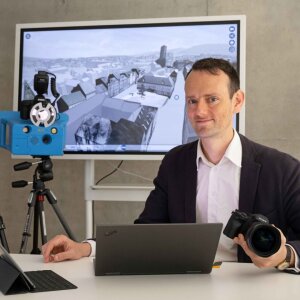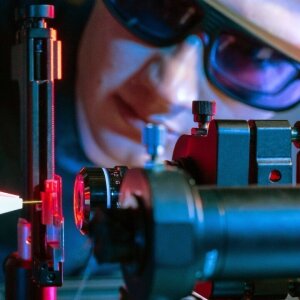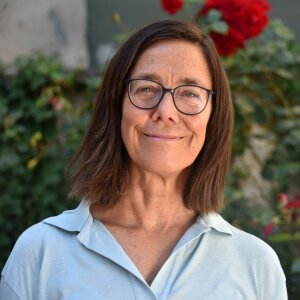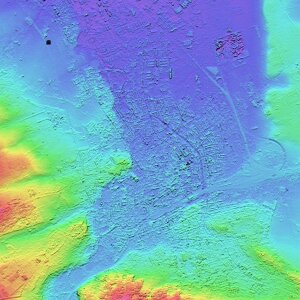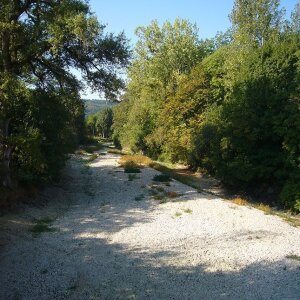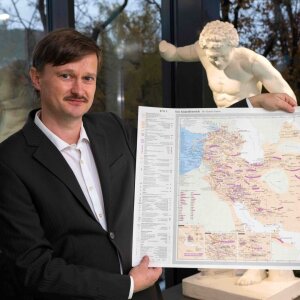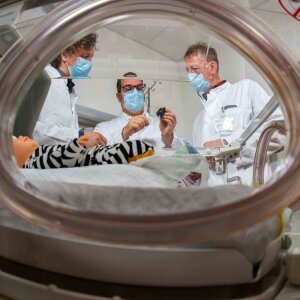New projects
Fairy tales from different cultures
Dr Elguja Dadunashvili holds the book »Dargi folktales« by Helma van den Berg in her hands for the research project »Caucasian narrative material in the discourse of comparative fairy tale research«.
Image: Jens Meyer (University of Jena)German Research Foundation (DFG) funds project on »Caucasian narratives in the discourse of comparative fairy tale research«
The project launched in September 2022 by Dr Elguja Dadunashvili (pictured) and Prof. Diana Forker from the Institute of Slavonic and Caucasus Studies is investigating the phenomenon that fairy tale subjects in different cultures are often astonishingly similar. Based on Caucasian narratives, the researchers want to establish, among other things, the authentic unfolding schemes of individual core stories or storylines in fairy tales and the backgrounds of the metaphorical motifs depicted in successive fairy tale episodes. The focus of the project is the construction of computer-aided infrastructure for the development of the fairy tale repertoire and the interdisciplinary use of the compiled text and metadata. [US]
New directions in digital teaching
Prof. Dr Sander Münster in a learning lab setup.
Image: Jens Meyer (University of Jena)Stiftung Innovative Hochschullehre funds two projects in the fields of digital humanities and medicine
Two projects launched at the University of Jena and Jena University Hospital (JUH) are receiving funds from Stiftung Innovative Hochschullehre as part of its »Freiraum 2022« programme. As part of the »Lehr-Lern-Hub: Digital History« project led by Prof. Sander Münster (pictured) in the Digital Humanities department, a teaching and learning lab is being developed and tested with a focus on history in the digital world. The aim is to develop and trial new formats to help students gain digital and practical skills (e.g. through school internships, full-day programmes and extra-curricular places of learning).
The medical project, which is being carried out in cooperation with Heilbronn University of Applied Sciences, is about digitally supported learning in interdisciplinary teams. [AB]
Quantum systems
Dr Tobias Vogl investigates single photon sources in 2D materials in an experimental setup.
Image: Jens Meyer (University of Jena)Junior research group receives 3.3 million euros in government funding
The Federal Ministry of Education and Research (BMBF) has pledged around 3.3 million euros in funding to a new junior research group for »Integrated Quantum Systems« over a period of five years. The group of five scientists has set itself the task of testing modern quantum technologies and establishing whether they are suitable for everyday use. The junior research group is headed by Dr Tobias Vogl (pictured) from the Institute of Applied Physics. »We see a great deal of promise in the combination of solid-state photonics and quantum materials,« says Dr Vogl. He and his team are particularly interested in researching the properties and potential applications of boron nitride. This compound of boron and nitrogen is an insulator that can form fluorescent defects that emit single photons when irradiated with a laser. [sl]
Public philosophy
Prof. Dr Andrea Marlen Esser, Professor of Philosophy with a focus on Practical Philosophy.
Image: Anne Günther (University of Jena)DFG provides one million euros in funding for Reinhart Koselleck project
The anti-racism protests of the Black Lives Matter movement and the responses to the racist and anti-Semitic attacks in Halle and Hanau have sparked a discussion amongst philosophers in the German-speaking world regarding the role of their own discipline in the history of European violence. Prof. Andrea Esser (pictured), Head of Practical Philosophy at the University of Jena, is currently involved in a project within the DFG's Reinhart Koselleck programme to investigate the problematic legacy of philosophy. The project, entitled »How to Deal with Racism, Sexism and Anti-Semitism in Works of Classical German Philosophy. A Critical and Self-Critical History of Philosophy as a ›Public Philosophy‹ Project«, will receive one million euros in funding from the DFG over a period of five years. [sl]
Environment and mental illness
Digital surface model of Erfurt.
Image: DLR 2022, TanDEM-XRemote sensing team involved in major EU project »environMENTAL«
The European »environMENTAL« consortium wants to identify mechanisms by which mental illnesses are triggered by phenomena such as climate change, urbanization and the COVID-19 pandemic. The consortium also includes a remote sensing team led by Dr Sören Hese. The EU has pledged nine million euros in funding until 2027. The researchers want to analyse data from healthy and sick people to uncover brain mechanisms related to environmental stress. They will correlate this data with measurements from remote sensing satellites (see photo), climate models and digital health applications, in order to illustrate the impact of environmental challenges on brain structure and function. [sh]
Drying river systems
The Albarine River in France was dry in the summer of 2022.
Image: Thibault DatryHydrologin forscht mit Partnerinstitutionen aus elf Ländern im Verbund »DRYvER«
In the hot summer of 2022, sinking water levels, cancelled ferries and the disrupted transport of goods via shipping routes made the news with increasing frequency. Dr Annika Künne from the University of Jena states that this situation has become the rule rather than the exception. The hydrologist is involved in »DRYvER«, a cooperative international research project with 25 partners from eleven countries. DRYvER is funded through the European Union's Horizon 2020 programme. The researchers are investigating how the drying up of river systems, accelerated by climate change and human water use, is affecting biodiversity, functional integrity and ecosystem services. Dr Künne's job is to create highly detailed river system models. [sl]
Sasanian Empire
Dr Frank Schleicher shows a map depicting Sasanian territory.
Image: Jens Meyer (University of Jena)DFG-funded project investigates power relations
The Neo-Persian Empire of the Sasanians was the arch-rival of the Roman Empire for many centuries. The Sasanian dynasty, which was named after the House of Sasan, controlled an area from around 224 AD that at times stretched from the Caucasus to the Indus. Dr Frank Schleicher (pictured), who specializes in ancient history, is investigating how the Sasanian dynasty was able to exert influence and power over vassals far beyond the borders of the empire itself. For this purpose, the modern concept of a »Commonwealth« is applied to the ancient cultures. Dr Schleicher was recently granted 343,000 euros in funding from the DFG to launch a research project entitled »Vassalage in the Sasanian Commonwealth«. He is examining the interactions between the imperial Kings of Kings and their princes in the periphery. [sl/JK]
New diagnostics
Project leaders Iwan Schie, Patrick Bräutigam and Hans Proquitté (from left) behind an incubator.
Image: Jens Meyer (University of Jena)»INTACT« project receives 750,000 euros from the Carl Zeiss Foundation
In Germany, doctors have to feed around 200 out of 800 very premature babies every year - mostly due to an infection - by diverting nutrients out of the body via an artificial intestinal outlet and returning the contents to another stoma to relieve the intestine. Currently, this can only be done manually, which does not guarantee a continuous transfer, requires very intensive care and impairs the babies' development. An interdisciplinary team from the University of Jena and Jena University Hospital, coordinated by the University of Applied Sciences Jena, is now looking to develop a miniaturized transport system featuring ultrasound and photonics-based sensors to enable the continuous transfer and analysis of the diverted intestinal contents. In doing so, the researchers want to facilitate better treatments for premature babies in the future. The Carl Zeiss Foundation is funding the »INTACT« project for two years. [sh]
